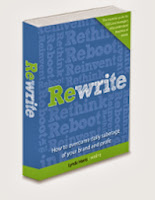"We’ve being reading a brilliant book lately called Simple — Conquering the crisis of complexity, by ‘simplicity warriors’ Alan Siegel and Irene Etzkorn.
Simple addresses the question of why we tolerate complexity in our lives and offers the concept of ‘breakthrough simplicity’ (starting afresh) as the antidote. The book is about:
- how complexity is costing us money, undermining government and business, and putting our health and even our lives at risk. (The book is full of stories and facts and figures.)
- how people are overwhelmed by quantity and complexity and are looking for a ‘back to basics’ approach as a way to simplify their own lives
- how organisations can use the concept of simplicity (especially in documents) to revolutionise the way they operate and achieve their purpose.
Much as I loved Simple, it told me (in very inspiring ways) what I already knew from our work over 23 years, and by the stories we know from the organisations we work with.
Read more about Rewrite and pre-order a copy
Buy Simple here











